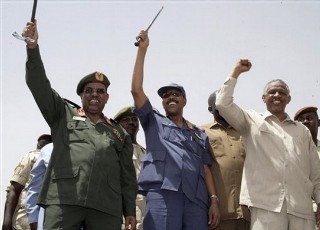Nafie warns South Sudan of an “African Spring”
February 15, 2012 (KHARTOUM) – Sudan’s presidential adviser, Nafie Ali Nafie, has advised the government of South Sudan to cooperate with Khartoum on economy or else risk “an African Spring” in its own backyard.

Failure to do so, Nafie warned, will expose the world’s newest country to the risk of “an African spring” or revolution by its own citizens.
The already tense relations between Khartoum and Juba have reached its nadir in recent weeks due to a bitter dispute over managing the transportation of South Sudan’s oil via Sudan.
Protracted talks between the two sides failed to agree on transit fees, sparking unilateral actions that saw Khartoum sequestrating Southern oil and Juba suspending production of the commodity which is lifeline of both economies.
Sudanese officials including President Al-Bashir accused Juba of attempting through the oil shut down to spark a popular uprising against the government in Khartoum.
Furthermore, Nafie warned Juba to refrain from supporting rebels in his country and distance itself from any conflicts waged by Western countries against Sudan.
Khartoum has recently threatened to retaliate against what its officials describe as South Sudan’s support to rebels fighting in Sudan’s border states of South Kordofan and Blue Nile.
The Sudanese government has been battling rebels who fought as part of South Sudan’s army before its independence in South Kordofan and Blue Nile since last year. Khartoum also accuses Western countries of standing behind what it describes as Juba’s intransigence in the oil talks.
Some Sudanese officials, most notably the country’s Foreign Minister Ali Karti, indicated that the issue of border security and South Sudan’s alleged support to Sudanese rebels must be discussed alongside the oil and economy related issues.
Conversely, officials in Juba called for the inclusion of disputed border areas, especially Abyei, in the ongoing oil talks.
In his statements, Nafie said that the security situation in South Kordofan and Blue Nile was calm by virtue of the Sudanese army’s full control.
Turning to the situation in Sudan’s western region of Darfur, where a nine year conflict has petered out, Nafie said that Darfur people no longer believe in the agendas of rebel groups who, according to him, receive support from Western circles to keep the war going.
The Sudanese government signed in mid-July last year a framework agreement to end Darfur conflict with one rebel faction. However, three other major groups rejected the deal which was signed under Qatari mediation in Doha.
(ST)
